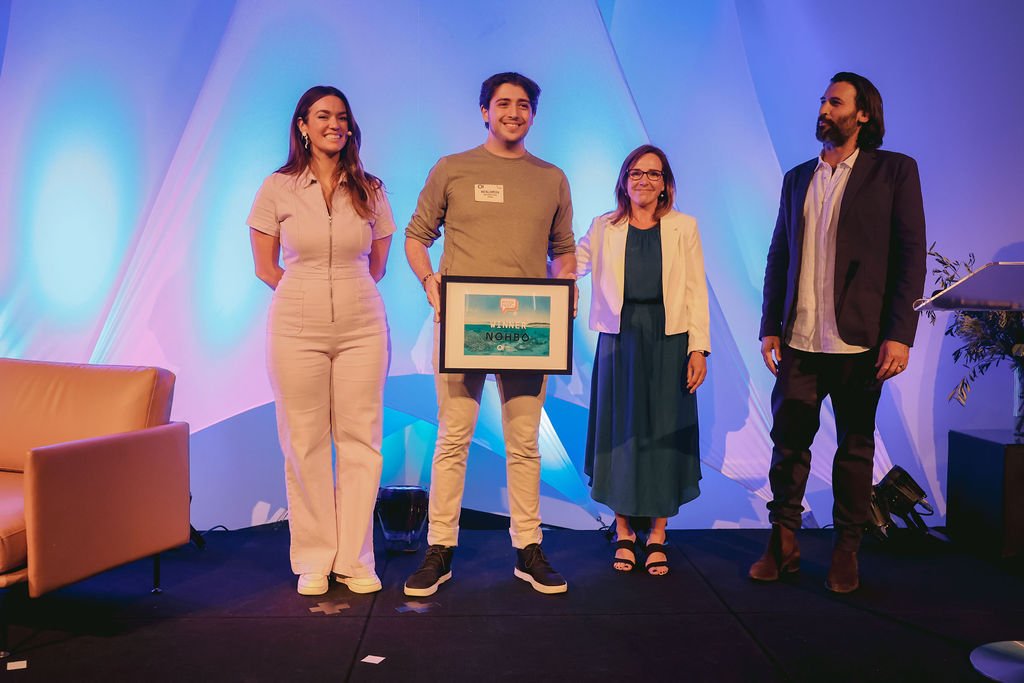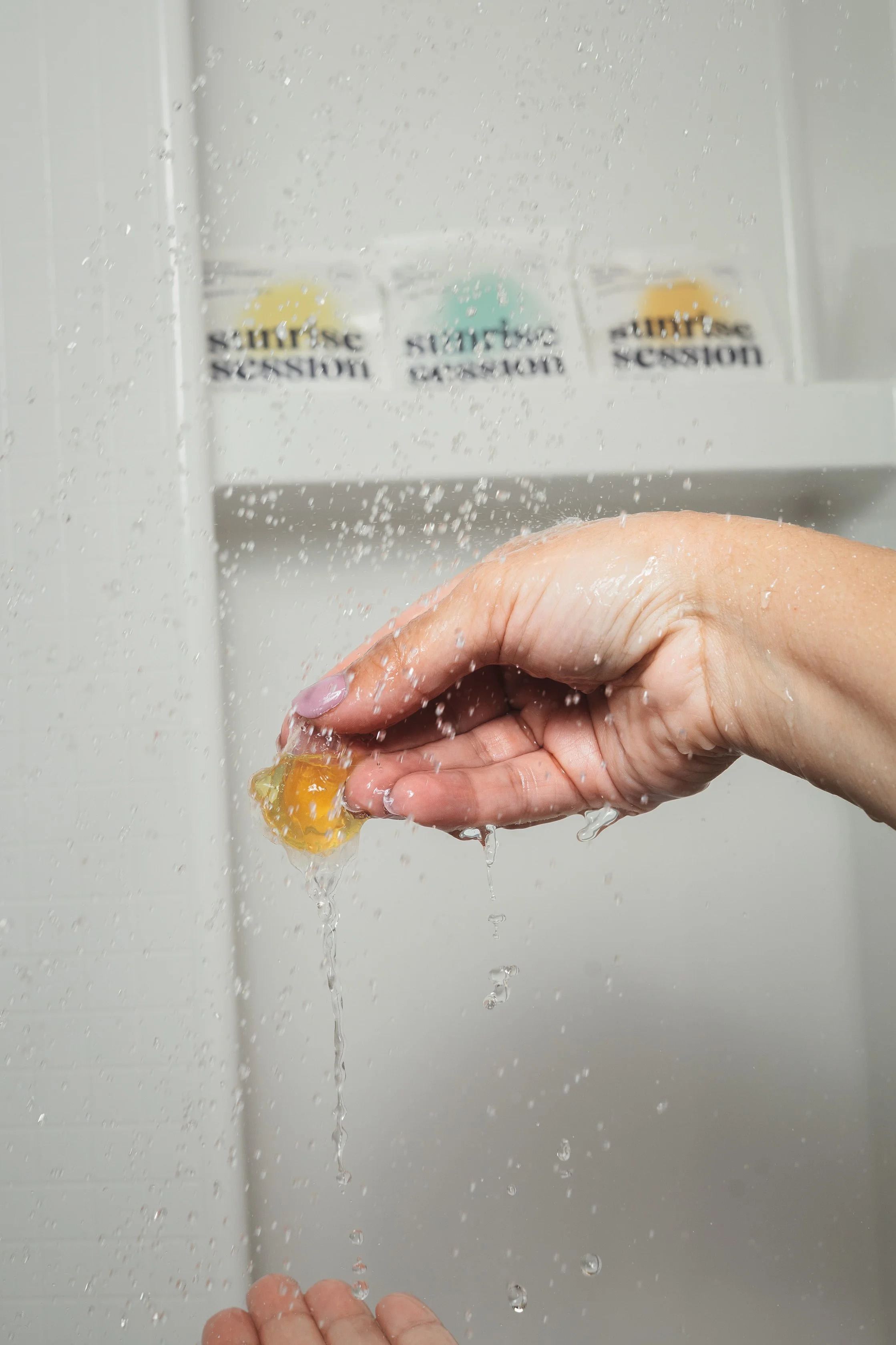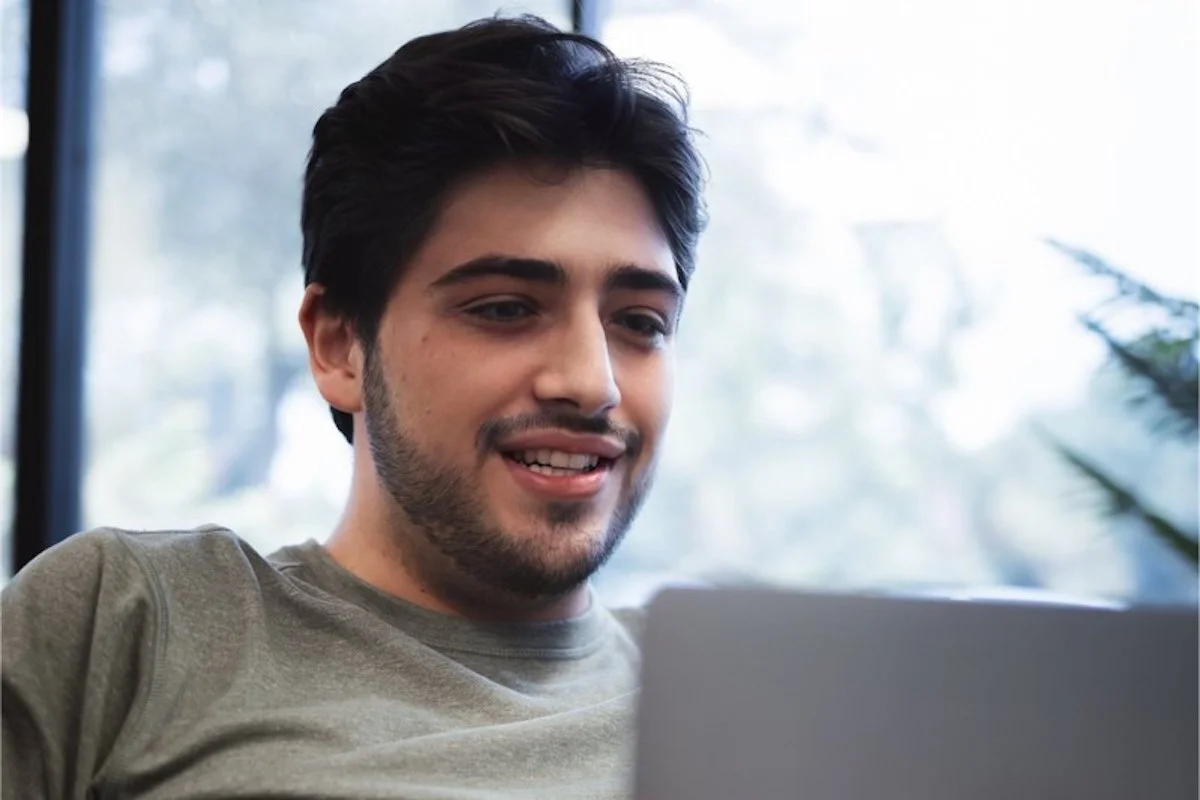The Startup Helping CPGs Ditch Single-Use Plastic: Ben Stern from Nohbo
There’s a big chance the items you’ll find in your bathroom make up some of the 120bn units of packaging produced by the beauty industry annually. And those single-use amenity bottles in hotels? According to The Wall Street Journal, an estimated 5bn of them are thrown away every year. Luckily, the Winner of the Ocean Impact Pitchfest 2022 has a solution to help Consumer Packaged Goods brands (CPG’s) and the hotel industry ditch single-use plastic.
For the tenth and final episode of our Pitchfest 2022 Series on the Ocean Impact Podcast, we chatted to Nohbo founder Ben Stern about everything from building a startup in a town on Florida’s “Space Coast,” receiving investment from Mark Cuban on Shark Tank at just 16 years old, and Nohbo’s goal of disrupting the sustainability market.
Nohbo makes packaging melt away. Encapsulating your favourite beauty and personal care products in a water-soluble and fully dissolvable film which is plastic-free, all natural, non-toxic, and leaves no trace behind.
The US-based material science startup was crowned the overall Winner of The Ocean Impact Pitchfest 2022 for their innovative solution to address single-use plastic packaging.
Pictured: Tania Juric, Associate General Counsel, ANZ & South East Asia, awarding Ben Stern as Winner of The Ocean Impact Pitchfest 2022 at INNOVOCEAN with Tim Silverwood and Laura Wells.
Like many of us, Ben grew up hearing the phrase “reduce, reuse, recycle” over and over again. But it never sat well with him. He thought that the most impactful products should disappear when you finish with them. Then, in his first year of high school, they watched a documentary about the plastic industry in biology. Ben was sickened, seeing the plastic flooding into the oceans and killing marine life. It struck a chord with him. And when he went home, he was struck with inspiration.
“I went home AND saw my mother using a laundry detergent pod and I thought it was the most genius idea in the world. like I couldn't Believe how science had enabled us to encapsulate liquids in films. engineered to dissolve with water”
Then, he walked into the bathroom and noticed all the plastic bottles surrounding the basin. That’s when Ben had the epiphany that would lead to founding Nohbo.
What if you could encapsulate beauty and personal care products in water soluble pods?
THE PROBLEM WITH SINGLE-USE PLASTIC
The beauty industry—encompassing skin care, hair care, personal care, and more - produces around 120bn units of packaging a year. And little of this is actually recycled. Around 14% might make it to a recycling plant, while only 9% is actually recycled.
The problem is not just that it’s plastic, but in the complicated designs used for this type of packaging:
The spray triggers, springs, and other mechanisms that make packaging twistable and squeezable
The tiny size of tubes, bottles, and tubs that are too small to be sorted
The composition of packaging; which can use mixed materials, and less-recyclable opaque or colour PET plastics
Most of this packaging is destined to end up in landfill, or waterways, or the ocean. And while many brands are trying to pivot to ‘bluer’ pastures, Nohbo feels these efforts are being put in the wrong place, “candidly I think CPGs are horrible at innovating, they take forever to create new products.... But it's very clear [that] consumer trends are going in the direction of sustainability, reducing their plastic consumption, etc. People care about the planet they're on,” said Ben.
What is Nohbo?
Nohbo - which stands for No Hair Bottles - aims to eliminate this single-use plastic waste from the personal care and beauty industry. And at the heart of Nohbo’s material science innovation is a plastic-free, naturally derived film made from sugarcane bagasse microbial ferments and cellulose. According to Ben, it breaks down faster than a banana and is fully biodegradable; meeting its match when exposed to water, and activating a nice thick, voluminous product.
“Water is a universal solvent, so it will go in and melt things. It’ll dissolve things naturally. The water-soluble film works as a fish net for everything inside, where everything is molecularly so big that it’s entrapped in this film and it can’t escape. Once water comes in, it dissolves the film and activates the things that make your shampoo unique”
Packaging aside, beauty and personal care products may contain anywhere from 60%-95% water, depending on the category. Nohbo’s solutions don’t just help reduce single-use plastic, they can also reduce the emissions associated with shipping across land and sea what is - essentially - mainly water.
In fact, according to Nohbo, if their Drops were used in lieu of plastic counterparts for a single day in the US, the impact would be huge: the equivalent weight of nearly 150 blue whales in plastic packaging avoided, 28 Olympic-sized swimming pools of water saved, and the prevention of 7200 sumo wrestler’s worth of preservatives from polluting water and waste streams.
How Nohbo is helping PERSONAL CARE BRANDS DITCH SINGLE-USE PLASTIC
Nohbo is helping CPGs and the hotel industry ditch single-use packaging by working with them to adapt their exisiting products into a ‘podded’ format. Besides it’s in-house brand “Sunrise Session,” Nohbo doesn’t actually create its own product lines. Its model instead democratises the technology - while protecting its IP - by working with companies to convert their existing single-use products over to one of Nohbo’s three formats.
When it came to hotel groups, Nohbo found that a lot of them didn’t want to take on the work of creating an in-house amenity brand. They wanted an existing brand in an exciting format. Sunrise Session is how Nohbo brings that to them, it’s something visceral for hotels who want to adopt this solution without a lot of effort. Helping those mini amenity bottles - of which the top 300 hotel groups in the world throw away around 5.5 billion each year - to become a thing of the past.
Sunrise Session - which takes up only a small part of Nohbo’s focus - actually started as a testing ground to gain market feedback. And as such, it’s also a direct-to-consumer (DTC) product range, allowing anyone to experience “plastic waste-free self care” for themselves.
Sunrise Session for hotel amenities
How does it work?
Nohbo’s current lineup includes three core technologies to help CPGs and hotels ditch single-use plastic packaging:
Drops
Drops are Nohbo’s single-serve water-soluble pods that contain a water-free liquid base. When exposed to water, the membrane dissolves, allowing ingredients to be released.
Slips
Slips are single-use sheets of biodegradable, water-soluble resin that have been embedded with active ingredients. Slips melt away in seconds with water, and lather, condition, or cleanse effectively. The idea for Slips struck Ben when he stayed at a hotel one time and realised that no one finishes a full bar of hotel soap.
Hydrofills
The newest in Nohbo’s range, Hydrofills are multi-serve water-soluble pods. When one Hydrofill pod is added to one bottle of water and shaken, a standard-sized personal care product is created. So the end-consumer is no longer paying to have water shipped across the world, or for single-use plastic packaging. Nohbo say it’s also highly adoptable: they can, for example, adopt consumers favourite shampoos from various brands into the Hydrofill format.
From shark tank success to pitchfest winner
The Nohbo journey started early. After his ‘eureka’ moment, Ben scribbled down the idea that would eventually become Nohbo drops. He got feedback - from the executives of two Fortune 500 companies no less, the result of countless hours of cold calls and emails - which reaffirmed the concept was worth bringing to life.
And at 14 years old, he had to face the same reality as adult entrepreneurs: how to finance his startup idea. He worked at a sub shop, as a trolley collector, and various other jobs in order to prototype his idea.
Then at 16, Ben signed up for Shark Tank and was accepted onto the show to pitch Nohbo Balls, the first generation of product. His appearence - with his late grandmother - marked his very first time pitching. It was a raging success: Ben was offered $100,000 investment from billionaire Mark Cuban.
The road wasn’t easy. Keeping the lights on is difficult for a startup, even without a global pandemic. But in 2020, Nohbo closed its first seed round of $3.6 million dollars. Ben is now 23 years old, and Nohbo has become a certified BCorp, built out their factory in Florida, and won The Ocean Impact Pitchfest 2022.
The ‘Cullbot’ in action in an urchin barren, assisting kelp restoration
Advice for emerging oceanpreneurs
When asked what advice he had for those growing their own ocean impact startup, or interesting in starting one, Ben had this to say.
Team first. tech second.
“One thing I learned the hard way is: start with a solid team and then build out the technology. I think team has to come before technology. Like, you can be inspired by a vision, but if you bring in the right people they'll solve the problems… If you focus so much on the technology, before building out the team, it hurts not only from a fundraising perspective but it also doesn't set the right infrastructure.”
indecision is worse than a bad decision
“Indecision is worse than a bad decision. It's very easy for complacency to set in, in a startup where you get comfortable after a fundraise or you're building a team and you focus so much on…bringing on larger hires, flashier titles. But nothing actually gets done. And it's very hard to break that. So I think setting up structure to make decisions rapidly and encourage decision making to happen, whether good or bad, is absolutely vital.”
Listen and Watch
New episodes of the Pitchfest 2022 Series will be releasing each week. Follow the Ocean Impact Podcast wherever you get your podcasts, or subscribe and watch on Youtube.








